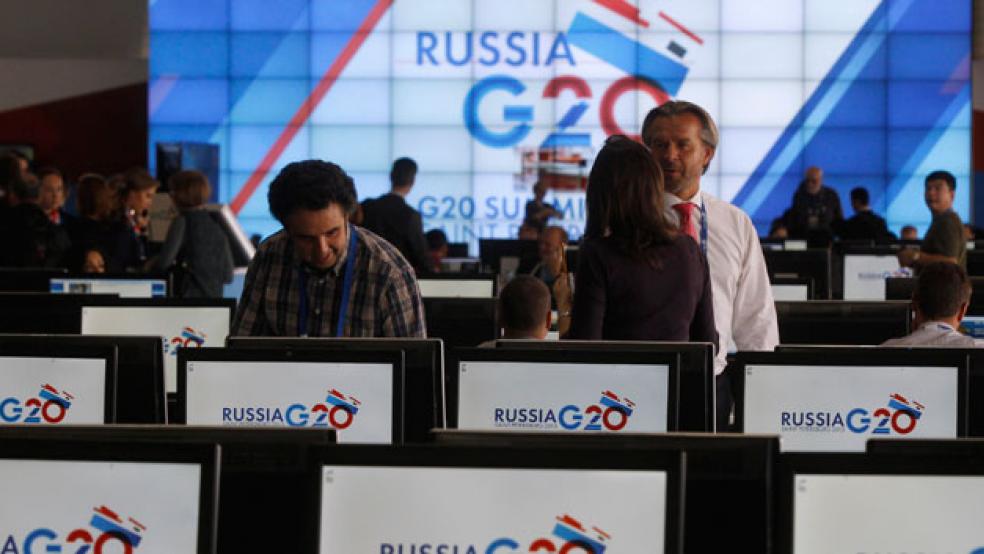With tensions at an all-time high at the G-20 meeting in St. Petersburg this week, President Obama and other world leaders may think the agenda is terrorism and genocide, not the global economy as originally planned.
What’s driving the discord is controversy over the path forward in Syria after a chemical attack killed civilians—including women and children--in Damascus on August 21. How to deal with the man who the U.S. believes is behind the attack—Syrian President Bashar al-Assad--has pitted Russia and its allies against the United States and other Western nations.
Welcome to the first meeting of world leaders who are engaged in the 21st Century Cold War.
President Obama had already cancelled a private meeting with Russian President Vladimir Putin over the Edward Snowden NSA surveillance mess. But things have only gotten worse since Putin granted asylum to the NSA leaker.
RELATED: WHAT’S AT STAKE IN THE 21ST CENTURY COLD WAR
The two men are at odds over Syria: Obama wants to attack Assad for his use of chemical weapons, while Putin is demanding more proof while standing in the way of U.N. action. Sources close to each have also hinted at mutual dislike between the two, hardly a pretense for a productive meeting. No less an authority on the Cold War than Mikhail Gorbachev said this week that he was “very alarmed” by the tone of rhetoric, calling it "dangerous."
“If there are data that the chemical weapons have been used, and used specifically by the regular army, this evidence should be submitted to the U.N. Security Council,” Putin said it an interview with the Associated Press Wednesday.
PUTIN TAUNTS OBAMA
Putin couldn’t resist the chance to prod Obama about the NSA leaks, adding, “[The data] ought to be convincing. It shouldn’t be based on some rumors and information obtained by special services through some kind of eavesdropping, some conversations and things like that.”
Meanwhile, Russian officials are trying to temper global expectations that the meeting could result in new global economic growth initiatives. Alexei Pushkov, chief of the Duma's foreign affairs committee, blamed this on Obama, saying the U.S. president would push his Syria stance.
“Despite the official agenda, the summit will mostly be about Syria,” he tweeted this week.
Putin, perhaps sensing that his G-20 was about to become a diplomatic disaster, struck a more conciliatory note Wednesday, saying he would be open to a strike against Syria if evidence of chemical warfare was incontrovertible and if the Security Council approved it. But he added he would be the one to decide the evidence’s merit, and that he found the idea of Assad gassing his own people beyond belief.
“From our viewpoint, it seems absolutely absurd that the armed forces, the regular armed forces, which are on the offensive today and in some areas have encircled the so-called rebels and are finishing them off, that in these conditions they would start using forbidden chemical weapons while realizing quite well that it could serve as a pretext for applying sanctions against them, including the use of force,” he said.
ALLIES WITH THEIR OWN AGENDAS
Obama is attempting to win broad support without Great Britain, a key ally who has stood with the United States in every conflict dating back to the Civil War. The British Parliament refused to back Prime Minister David Cameron’s call for action in Syria, leaving the U.K. on the sidelines.
That leaves France and Germany as the two biggest allies that back the United States. But France wants to use the talks to push the U.S.-EU trade pact meant to kick-start the European economy. And German Chancellor Angela Merkel is unlikely to engage in much Syrian rhetoric two weeks before her tough reelection bid. Instead, she’s indicated she plans to bring up hedge fund reform, an issue near and dear to the German public.
That leaves Obama to his own devices to win support for military action in Syria. Putin has already indicated he will stand in Obama’s way every chance he gets. Perhaps this is why expectations for the summit have already plummeted. It’s a zero sum game.
“Since the end of the cold war, I have never seen the personal relationship between a U.S. and a Russian president sink this low,” said Dmitry Trenin, head of the Carnegie Moscow Centre, told The Financial Times. "“Everyone I know has very low expectations."






